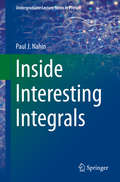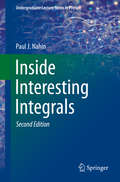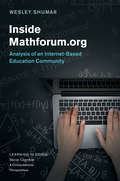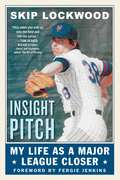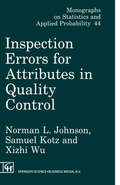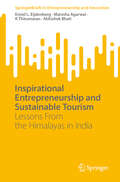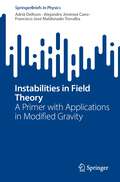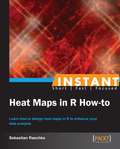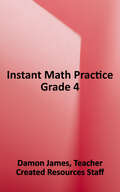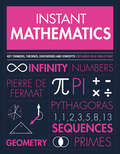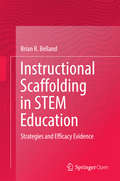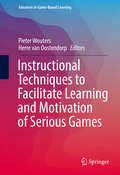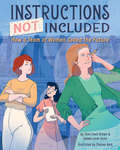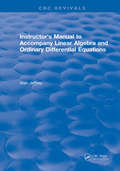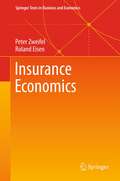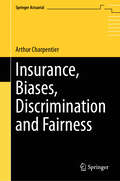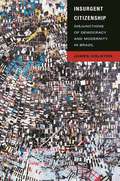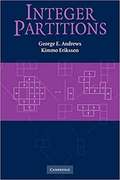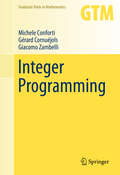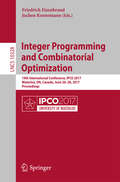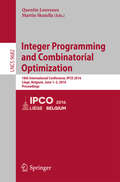- Table View
- List View
Inside Interesting Integrals
by Paul J. NahinWhat's the point of calculating definite integrals since you can't possibly do them all?. What makes doing the specific integrals in this book of value aren't the specific answers we'll obtain, but rather the methods we'll use in obtaining those answers; methods you can use for evaluating the integrals you will encounter in the future. This book is written in a light-hearted manner for students who have completed the first year of college or high school AP calculus and have just a bit of exposure to the concept of a differential equation. Every result is fully derived. If you are fascinated by definite integrals, then this is a book for you.
Inside Interesting Integrals: A Collection of Sneaky Tricks, Sly Substitutions, and Numerous Other Stupendously Clever, Awesomely Wicked, and Devilishly Seductive Maneuvers for Computing Hundreds of Perplexing Definite Integrals From Physics, Engineering, and Mathematics (Plus Numerous Challenge Problems with Complete, Detailed Solutions) (Undergraduate Lecture Notes in Physics)
by Paul J. NahinWhat’s the point of calculating definite integrals since you can’t possibly do them all?What makes doing the specific integrals in this book of value aren’t the specific answers we’ll obtain, but rather the methods we’ll use in obtaining those answers; methods you can use for evaluating the integrals you will encounter in the future.This book, now in its second edition, is written in a light-hearted manner for students who have completed the first year of college or high school AP calculus and have just a bit of exposure to the concept of a differential equation. Every result is fully derived. If you are fascinated by definite integrals, then this is a book for you. New material in the second edition includes 25 new challenge problems and solutions, 25 new worked examples, simplified derivations, and additional historical discussion.
Inside Mathforum.org: Analysis of an Internet-Based Education Community (Learning in Doing: Social, Cognitive and Computational Perspectives)
by Wesley ShumarThe internet has dramatically transformed social space and time for many people in many different contexts. This dramatic warping of the social fabric has happened slowly over time as digital technologies have evolved and internet speeds have increased. While we are all aware of these changes, the impact is often little understood. There are few monographs about social groups made possible by the internet, and even fewer about educational communities made possible through digital technologies. Inside Mathforum. org details the ways that digital media are used to enhance the practices that teachers and students of mathematics engage in. The book also shows how different kinds of mathematical conversations and interactions become possible through the digital media. Unlike many other educational uses of digital media, the Math Forum's community has provided online resources and sustained support for teachers and students, and it leads the way in showing the power of digital media for education.
Insight Pitch: My Life as a Major League Closer
by Skip Lockwood Fergie JenkinsYou're straddling the pitcher's mound in Shea Stadium. The game rests in your hands. Your heart is pounding. Big money is at stake. You feel thousands of eyes burning your jersey as they wait for a pitch. You gulp at the air trying to settle your nerves. It's go time. Insight Pitch is a sports story that spills over three decades. Retired Major League Baseball pitcher Skip Lockwood tells anecdotes from throughout his career as a ballplayer, starting with his days as a Little Leaguer through his professional tenure with the Kansas City Athletics, Seattle Pilots, Milwaukee Brewers, California Angels, New York Mets, and Boston Red Sox, before his retirement in 1980. Along the way, he details both the on- and off-the-field shenanigans as well as the enormous psychological process that he underwent each and every time he took the mound. Readers will find some laughs along the way and marvel as they share the locker room with legends like Jesse Owens, Satchel Paige, Catfish Hunter, and Yogi Berra. Humorous but insightful, this book makes the perfect addition to any baseball fan's shelf.
Inspection Errors for Attributes in Quality Control (Chapman And Hall/crc Monographs On Statistics And Applied Probability Ser. #44)
by Samuel Kotz Norman L. Johnson Xi-Zhi WuThis book provides a comprehensive survey of the most recent methodology--both theoretical and applied--on the statistical analysis and detection of defective/"non-conforming" items in various types of inspection for attributes, when the inspection itself is subject to error.
Inspirational Entrepreneurship and Stimulating Tourism: Lessons From the Himalayas in India (SpringerBriefs in Entrepreneurship and Innovation)
by Emiel L. Eijdenberg Abhishek Bhati K Thirumaran Manisha AgarwalThis book explores inspirational entrepreneurial activities in the tourism industry of Ladakh, India. It particularly looks at ways to develop an entrepreneurial yet environment-friendly tourist destination. The book starts off with in-depth historical reflections of entrepreneurship and tourism in one of India&’s fastest growing tourist destinations. Subsequently, the book studies the unique entrepreneurial challenges and opportunities in Ladakh&’s extreme resource-scarcity and remote context based on empirical evidence from entrepreneurs and stakeholders in the tourism industry. In addition, a broad overview of contemporary entrepreneurial activities in the tourism industry in Ladakh is presented, underscoring the importance of indigenous knowledge and cultural traditions for developing sustainable tourism. Based on qualitative data analyses and literature reflections, this book provides scholars, students, professionals and policymakers an alternative view on entrepreneurial activities in the tourism industry of an ecologically jeopardized region.
Instabilities in Field Theory: A Primer with Applications in Modified Gravity (SpringerBriefs in Physics)
by Adrià Delhom Alejandro Jiménez Cano Francisco José Maldonado TorralbaThis book presents the most common types of instabilities arising in classical field theories, namely tachyonic, Laplacian, ghost-like or strong coupling instabilities, also commenting on their quantum implications. The authors provide a detailed account on the Ostrogradski theorem and its implications for higher-order time-derivative field theories. After presenting the general concepts and formalism, they dive into its applications to particular field theories, using mainly modified gravity theories as examples. The book is intended for advanced undergraduate/graduate students, but can also be useful for researchers, for having a unified exposition of general results on instabilities in field theory and examples of their applications.
Instant Heat Maps in R How-to
by Sebastian RaschkaFilled with practical, step-by-step instructions and clear explanations for the most important and useful tasks. Heat Maps in R: How-to is an easy to understand book that starts with a simple heat map and takes you all the way through to advanced heat maps with graphics and data manipulation.Heat Maps in R: How-to is the book for you if you want to make use of this free and open source software to get the most out of your data analysis. You need to have at least some experience in using R and know how to run basic scripts from the command line. However, knowledge of other statistical scripting languages such as Octave, S-Plus, or MATLAB will suffice to follow along with the recipes. You need not be from a statistics background.
Instant Math Practice Grade 4
by Teacher Created Resources Staff Damon JamesThis series offers a quick and easy way to supplement your math curriculum to meet Common Core Standards. Over 120 practice pages cover the key areas: Number and Operations, Algebra, Geometry, Measurement and Data, and Problem Solving. Each page addresses a specific topic, and many activities offer multiple ways to find solutions.
Instant Mathematics: Key Thinkers, Theories, Discoveries And Concepts Explained On A Single Page (Instant Knowledge)
by Paul Parsons Gail DixonKey thinkers, theories, discoveries, and concepts each explained on a single page! Instant Mathematics pulls together all the pivotal mathematical theories and discoveries into one concise volume. Each page contains a distinct “cheat sheet,” which tells you the most important facts in bite-size chunks, so you can feel like an expert in minutes! From zero to Riemann Hypothesis, from primes to irrational numbers, and from Pythagoras to John Nash and Roger Penrose—every key figure, theory, or term is expressed in succinct and lively text and graphics. Perfect for the knowledge-hungry and time-poor, this collection of graphics-led lessons makes math interesting and accessible. Everything you need to know—and more!—packed into one convenient volume.
Institutions, Property Rights, and Economic Growth
by Sebastian Galiani Itai SenedThis volume showcases the impact of the work of Douglass C. North, winner of the Nobel Prize and father of the field of new institutional economics. Leading scholars contribute to a substantive discussion that best illustrates the broad reach and depth of Professor North's work. The volume speaks concisely about his legacy across multiple social sciences disciplines, specifically on scholarship pertaining to the understanding of property rights, the institutions that support the system of property rights, and economic growth.
Instructional Scaffolding in STEM Education
by Brian R. BellandThis book uses meta-analysis to synthesize research on scaffolding and scaffolding-related interventions in STEM (science, technology, engineering, and mathematics) education. Specifically, the volume examines the extent to which study quality, assessment type, and scaffolding characteristics (strategy, intended outcome, fading schedule, scaffolding intervention, and paired intervention) influence cognitive student outcomes. It includes detailed descriptions of the theoretical foundations of scaffolding, scaffolding strategies that have been proposed to meet different intended learning outcomes in STEM, and associated efficacy information. Furthermore, the book describes assessment strategies and study designs which can be used to evaluate the influence of scaffolding, and suggests new fields in which scaffolding strategies that have proven efficacious may be used.
Instructional Techniques to Facilitate Learning and Motivation of Serious Games
by Pieter Wouters Herre Van OostendorpThe book introduces techniques to improve the effectiveness of serious games in relation to cognition and motivation. These techniques include ways to improve motivation, collaboration, reflection, and the integration of gameplay into various contexts. The contributing authors expand upon this broad range of techniques, show recent empirical research on each of these techniques that discuss their promise and effectiveness, then present general implications or guidelines that the techniques bring forth. They then suggest how serious games can be improved by implementing the respective technique into a particular game.
Instructions Not Included: How a Team of Women Coded the Future
by Tami Lewis BrownClick. Whir. Buzz.Not so long ago, math problems had to be solved with pencil and paper, mail delivered by postman, and files were stored in paper folders and metal cabinets. But three women, Betty Snyder, Jean Jennings, and Kay McNulty knew there could be a better way. During World War II, people hoped ENIAC (Electronic Numerical Integrator and Computer), one of the earliest computers, could help with the war effort. With little guidance, no instructions, and barely any access to the machine itself, Betty, Jean, and Kay used mathematics, electrical engineering, logic, and common sense to command a computer as large as a room and create the modern world. The machine was like Betty, requiring outside-the-box thinking, like Jean, persistent and consistent, and like Kay, no mistakes, every answer perfect. Today computers are all around us, performing every conceivable task, thanks, in large part, to Betty, Jean, and Kay's pioneering work. Instructions Not Included is their story.This fascinating chapter in history is brought to life with vivid prose by Tami Lewis Brown and Debbie Loren Dunn and with striking illustrations by Chelsea Beck. Detailed back matter including historical photos provides a closer look.
Instructors Manual to Accompany Linear Algebra and Ordinary Differential Equations
by Alan JeffreyFirst published in 1990.
Insurance Economics
by Peter Zweifel Roland EisenInsurance Economics brings together the economic analysis of decision making under risk, risk management and demand for insurance by individuals and corporations, objectives pursued and management tools used by insurance companies, the regulation of insurance, and the division of labor between private and social insurance. Appropriete both for advanced undergraduate and graduate students of economics, management, and finance, this text provides the background required to understand current research. Predictions derived from theoretical argument are not only stated but confronted with empirical evidence. Throughout the book, conclusions summarize results, helping readers to check their knowledge and understanding. Issues discussed include paradoxa in decision making under risk, selection of favorable risks by insurers, the possibility of a "death spiral" in insurance markets, and future challenges such as re-regulation in the wake of the 2007-09 financial crisis and the increasing availability of generic information.
Insurance, Biases, Discrimination and Fairness (Springer Actuarial)
by Arthur CharpentierThis book offers an introduction to the technical foundations of discrimination and equity issues in insurance models, catering to undergraduates, postgraduates, and practitioners. It is a self-contained resource, accessible to those with a basic understanding of probability and statistics. Designed as both a reference guide and a means to develop fairer models, the book acknowledges the complexity and ambiguity surrounding the question of discrimination in insurance. In insurance, proposing differentiated premiums that accurately reflect policyholders' true risk—termed "actuarial fairness" or "legitimate discrimination"—is economically and ethically motivated. However, such segmentation can appear discriminatory from a legal perspective. By intertwining real-life examples with academic models, the book incorporates diverse perspectives from philosophy, social sciences, economics, mathematics, and computer science. Although discrimination has long been a subject of inquiry in economics and philosophy, it has gained renewed prominence in the context of "big data," with an abundance of proxy variables capturing sensitive attributes, and "artificial intelligence" or specifically "machine learning" techniques, which often involve less interpretable black box algorithms.The book distinguishes between models and data to enhance our comprehension of why a model may appear unfair. It reminds us that while a model may not be inherently good or bad, it is never neutral and often represents a formalization of a world seen through potentially biased data. Furthermore, the book equips actuaries with technical tools to quantify and mitigate potential discrimination, featuring dedicated chapters that delve into these methods.
Insurgent Citizenship: Disjunctions of Democracy and Modernity in Brazil (In-Formation)
by James HolstonInsurgent citizenships have arisen in cities around the world. This book examines the insurgence of democratic citizenship in the urban peripheries of São Paulo, Brazil, its entanglement with entrenched systems of inequality, and its contradiction in violence. James Holston argues that for two centuries Brazilians have practiced a type of citizenship all too common among nation-states--one that is universally inclusive in national membership and massively inegalitarian in distributing rights and in its legalization of social differences. But since the 1970s, he shows, residents of Brazil's urban peripheries have formulated a new citizenship that is destabilizing the old. Their mobilizations have developed not primarily through struggles of labor but through those of the city--particularly illegal residence, house building, and land conflict. Yet precisely as Brazilians democratized urban space and achieved political democracy, violence, injustice, and impunity increased dramatically. Based on comparative, ethnographic, and historical research, Insurgent Citizenship reveals why the insurgent and the entrenched remain dangerously conjoined as new kinds of citizens expand democracy even as new forms of violence and exclusion erode it. Rather than view this paradox as evidence of democratic failure and urban chaos, Insurgent Citizenship argues that contradictory realizations of citizenship characterize all democracies--emerging and established. Focusing on processes of city- and citizen-making now prevalent globally, it develops new approaches for understanding the contemporary course of democratic citizenship in societies of vastly different cultures and histories.
Integer Linear Programming in Computational and Systems Biology: An Entry-Level Text and Course
by Dan GusfieldInteger linear programming (ILP) is a versatile modeling and optimization technique that is increasingly used in non-traditional ways in biology, with the potential to transform biological computation. However, few biologists know about it. This how-to and why-do text introduces ILP through the lens of computational and systems biology. It uses in-depth examples from genomics, phylogenetics, RNA, protein folding, network analysis, cancer, ecology, co-evolution, DNA sequencing, sequence analysis, pedigree and sibling inference, haplotyping, and more, to establish the power of ILP. This book aims to teach the logic of modeling and solving problems with ILP, and to teach the practical 'work flow' involved in using ILP in biology. Written for a wide audience, with no biological or computational prerequisites, this book is appropriate for entry-level and advanced courses aimed at biological and computational students, and as a source for specialists. Numerous exercises and accompanying software (in Python and Perl) demonstrate the concepts.
Integer Partitions
by George E. Andrews Kimmo ErikssonThe theory of integer partitions is a subject of enduring interest as well as a major research area. It has found numerous applications, including celebrated results such as the Rogers-Ramanujan identities. The aim of this introductory textbook is to provide an accessible and wide-ranging introduction to partitions, without requiring anything more than some familiarity with polynomials and infinite series. Many exercises are included, together with some solutions and helpful hints.
Integer Programming
by Michele Conforti Gérard Cornuéjols Giacomo ZambelliThis book is an elegant and rigorous presentation of integer programming, exposing the subject's mathematical depth and broad applicability. Special attention is given to the theory behind the algorithms used in state-of-the-art solvers. An abundance of concrete examples and exercises of both theoretical and real-world interest explore the wide range of applications and ramifications of the theory. Each chapter is accompanied by an expertly informed guide to the literature and special topics, rounding out the reader's understanding and serving as a gateway to deeper study. Key topics include: formulations polyhedral theory cutting planes decomposition enumeration semidefinite relaxations Written by renowned experts in integer programming and combinatorial optimization, Integer Programming is destined to become an essential text in the field.
Integer Programming and Combinatorial Optimization
by Friedrich Eisenbrand Jochen KoenemannTheidea ofa refereedconferencefor the mathematicalprogrammingcommunity was proposed by Ravi Kannan and William Pulleyblank to the Mathematical Programming Society (MPS) in the late 1980s. Thus IPCO was born, and MPS has sponsored the conference as one of its main events since IPCO I at the University of Waterloo in 1990. The conference has become the main forum for recent results in Integer Programming and Combinatorial Optimization in the non-Symposium years. This volume compiles the papers presented at IPCO XIV held June 9-11, 2010, at EPFL in Lausanne. The scope of papers considered for IPCO XIV is likely broader than at IPCO I. This is sometimes due to the wealth of new questions and directions brought from related areas. It can also be due to the successful application of "math programming" techniques to models not tra- tionally considered. In any case, the interest in IPCO is greater than ever and this is re?ected in both the number (135) and quality of the submissions. The ProgrammeCommittee with 13 memberswasalsoIPCO'slargest. We thankthe members of the committee, as well as their sub-reviewers, for their exceptional (and time-consuming) work and especially during the online committee meeting held over January. The process resulted in the selection of 34 excellent research papers which were presented in non-parallel sessions over three days in L- sanne. Unavoidably, this has meant that many excellent submissions were not able to be included.
Integer Programming and Combinatorial Optimization
by Martin Skutella Quentin LouveauxThis book constitutes therefereed proceedings of the 18th International Conference on IntegerProgramming and Combinatorial Optimization, IPCO 2016, held in Liège, Belgium,in June 2016. The 33 full papers presented were carefully reviewed and selectedfrom 125 submissions. The conference is a forum for researchers andpractitioners working on various aspects of integer programming andcombinatorial optimization. The aim is to present recent developments intheory, computation, and applications in these areas. The scope of IPCO isviewed in a broad sense, to include algorithmic and structural results ininteger programming and combinatorial optimization as well as revealingcomputational studies and novel applications of discrete optimization topractical problems.
